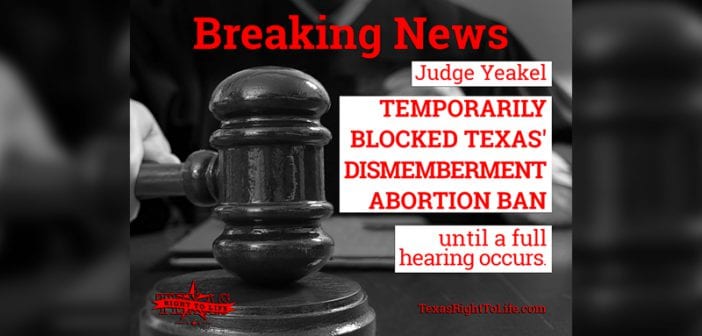FOR IMMEDIATE RELEASE: District judge order places hold on Dismemberment Abortion Ban
Austin, Texas—August 31, 2017: Today, a U.S. District Court judge ordered a temporary restraining order against enforcement of the Pro-Life Dismemberment Abortion Ban, which is scheduled to go into effect on Friday, September 1. Judge Lee Yeakel of the Western District of Texas filed the order today placing the measure on hold while the full lawsuit by the abortion industry against the State of Texas moves forward.
The Dismemberment Abortion Ban outlaws a specific abortion procedure in which a living preborn child is killed by being torn limb from limb in utero. The Dismemberment Abortion Ban was Texas Right to Life’s top priority for the 85th Session of the Texas Legislature and was the most widely supported Pro-Life policy platform plank for the Republican Party of Texas. The legislation was initially filed by Senator Charles Perry (R-Lubbock) and Representative Stephanie Klick (R-Fort Worth). Senator Perry’s SB 415 passed the full Senate early in the regular session with bipartisan support on a 21-9 vote, but the companion was stalled in the House, prompting Representative Klick to propose the legislation as an amendment to Senate Bill 8 on the House floor. The amendment passed with overwhelming bipartisan support of House members on a vote of 92-42, and Governor Abbott signed Senate Bill 8 as amended into law shortly after the session.
The abortion industry disingenuously argued in court that the Dismemberment Abortion Ban raises an undue burden for women seeking second trimester abortions by banning all D&E abortions. In filings and in court, the Texas Attorney General’s office powerfully argued SB 8 clearly only prohibits one specific type of D&E abortion, which the state Legislature defined as “Dismemberment Abortions.” The abortion clinic lawyers are attempting to frame this lawsuit on how SB 8 will affect Texas women and the abortion industry, however the important question before the court is whether this type of procedure is something Texas has the right to prohibit. In the hearing over the temporary restraining order earlier this week, the attorney for the state opened his comments in court clarifying, “SB 8 is designed to do one thing: stop the brutal and gruesome procedure of living dismemberment abortions.”
The legal challenge from abortion providers and the Center for Reproductive Rights comes as no surprise to Pro-Life advocates. Texas Right to Life anticipated such a legal challenge to the strongest Pro-Life legislation of the session, and still chose the Dismemberment Abortion Ban as the next logical step for the Pro-Life movement in undermining the legal foundation of Roe v. Wade. Pro-Life legal scholars anticipate that the Dismemberment Abortion Ban will successfully stand in court like the federal Partial Birth Abortion Ban, which also outlawed a specific and particularly gruesome and inhumane abortion procedure. Additionally, in the 2007 ruling of Gonzales v. Carhart, the Supreme Court of the United Sates confirmed states have a compelling interest in protecting the integrity and ethics of the medical profession and in protecting the life of the preborn child, which further strengthens Texas’s case in defending the Dismemberment Abortion Ban.
While some Pro-Lifers may be tempted to despair at today’s ruling, this is the first step in a longer and consequential legal battle over this dynamic and historic legislation. Judge Yeakel’s granting of the TRO today is expected given his past of ruling against Pro-Life legislation. Earlier this week in court, Yeakel described his court as “a whistle stop on the way to New Orleans, then onto DC,” because the vast majority of his rulings on important bills like the Dismemberment Abortion Ban are typically appealed to a higher court. Texas Right to Life is thankful to Attorney General Ken Paxton and his expert team who have stated their dedication to defending the Dismemberment Abortion Ban to the highest court necessary.

